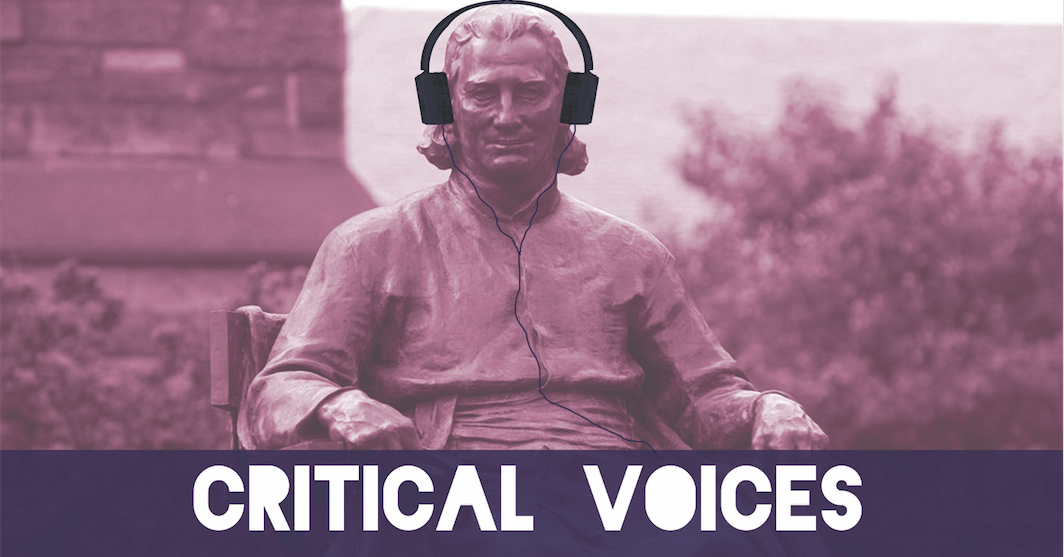With Wilco’s new album Ode to Joy, the alt-rock band explores the relationship between love and pain with hazy vocals, wandering lyrics, and eclectic instrumentals. Although never explicitly political, Ode to Joy is deeply tied with the current cultural moment with lines like, “For all the people that I am not / And all their prayers and all their thoughts,” and, “I remember when wars would end.” It’s an album that is aware of modern anxieties and deals with them in a vulnerable and honest way. As Wilco’s eleventh studio album over the course of the band’s 25-year run, Ode to Joy proves that the band still has its finger on the pulse of prevailing contemporary American culture.
Incorporating a range of musical styles, the album combines methodically-placed, ephemeral sounds, like bells, light flute sounds, consistent strumming of an acoustic guitar, and an occasional electric guitar riff. Certainly contrasting, the music can sometimes border on conflicting and confusing, although this ultimately serves the album well. It allows the album to take on a psychedelic, uneasy nature. The album is playfully jarring, with lyrics that at times seem to war with the musical mood of various songs (most especially on “Citizens,” where Wilco’s lead singer, Jeff Tweedy sings about a “pine box, “white lies,” and “high crimes, as the band plays an upbeat, jangling ditty that sounds like it could be used in kids’ show). This renders Ode to Joy both unsettling and loving.
Although it can, at times, be rather somber, Ode to Joy is hopeful, at times even bordering on cheerful (see “Everyone Hides”). It’s the lastest phase in the evolution of a band slowly bending towards optimism– Wilco’s last studio album, Schmilco, was once described by Consequence of Sound writer Dan Caffrey as “joyously negative.”
The album begins with the dark and moody song “Bright Leaves,” which is followed up by the track “Before Us,” a sleepy and somber reflection. “One and a Half Stars” acts as an ironic take on a love song, with music like a wedding march and lyrics like, “There is no mother like pain.” The longest track on the album, “Quiet Amplifier,” is sparse in lyrics and yet musically interesting enough to fill its five-minute-and-fifty-second run time.
“Everyone Hides,” the first single on the album, takes a surprisingly hopeful turn. It reflects on the human tendency to mask certain parts of ourselves, to keep secrets, and to idealize ourselves in our minds, and yet still manages to be a joyful, welcoming tune, with an accompanying music video in which the members of Wilco play hide-and-go-seek across various landmarks in the city of Chicago.
On “White Wooden Cross,” a definite stand-out track on the album, the seemingly joyful instrumentation contrasts with lyrics reflecting on how the singer would react to the death of a lover (“Tell me no lies / Tell me no lies / Is it stranger to live? / Is it stranger to die?”). “Citizens” introduces a warmly trippy aspect to the album, which is contrasted by the dirge-like, crescendoing “We Were Lucky.”
The second single on the album, “Love is Everywhere (Beware),” is both bright and cautiously optimistic, as it explores the relationship between love and complacency. It’s soft, inviting, but its also supposed to be a shock to the system, a warning to expand one’s love beyond their immediate circle of loved ones.
“I’m starting to feel like being confident in that equation isn’t always the best motivation for me to be my best self—it can kind of let me off the hook a little bit when I think I should be striving to contribute more love outside of my comfortable sphere of family and friends,” Tweedy said in a press release. “I guess the song is sort of a warning to myself that YES, Love IS EVERYWHERE, but also BEWARE! I can’t let that feeling absolve me of my duty to create more.”
With their next song, “Hold Me Anyways,” Wilco makes an anxious-yet-triumphant declaration of their willingness to love and be loved in the face of pain and emptiness, to the melodic strumming of a guitar and twinkling percussions in the background, resulting in something that’s almost ecstatic. “An Empty Corner” closes out the album with more slow, mournful vocals and eclectic instrumentation, yet still manages to be comforting and loving, almost crooning.
All in all, Ode to Joy is cohesive, deeply personal, and hopeful. It is consistently engrossing and musically creative. This warm, introspective, and experimental album is ultimately a commanding success for Wilco.




